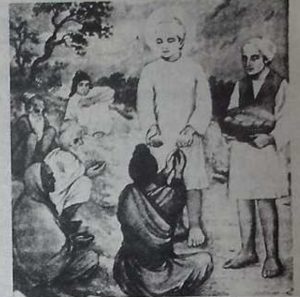
Soon after, Nanak gave up cattle-grazing, for an acute fit of melancholy overtook him. It was widely believed that he was taken by an evil spirit, Many a physician and a necromancer was summoned to effect his cure, but to no avail.
After a couple of months, however, he recovered of his own and his worrying parents were much relived. One day the Mehta called Nanak into his presence and said, “My son, you arc grown up now. It is but meet that you should stand on your own feet. Here is some money. Go to the market and try your hand at some gainful bargain.” Obedient to his father’ behest, Nanak set out to Chuharkana, a market town some 20 miles from
Talwandi, Bala, an attendant of his father, accompanied him, They had just reached the outskirts of the market town, when they met some ill clad and ill fed sadhus. Their sad plight excited Nanak’s pity. “What is more gainful” thought he, “than to feed the hungry and clothe the naked!”
So, he purchased raiment and food and distributed these among the sadhus and retuned homewards.
On the way back some misgivings arose in his mind about his father’s expected reaction to this bargain ‘and he considered it penitent to stay outside the village till the storm blew over. Bala went home alone to report the matter.
When the Mehta knew what had actually transpired, his anger broke all restraint. He rushed to the spot where Nanak sat, belabored him and dragged him home.
In those far off days, Sultanpur, now in Kapurthala District, was an important military cantonment The Governor, Daulat Khan Lodhi, was an uncle of Ibrahim Lodhi, the Sultan of Delhi,
Jai Ram, the husband of Nanaki, was an official at the court of Daulat Khan. He often visited Talwandi in connection with official business.
Finding Mehta Kalu sorely distracted on his son’s account, Rai Bular advised Jai Ram to take Nanak 10 Sultanpur and find some work forhim.Jai Ram accepted his suggestion and had him appointed as modi ‘or manager of the Government granary. Nanak was 15 years old then and was a model of efficient and honest dealings. At Sultanpur, too, it was his daily wont to be up early at dawn, have a dip in the Baen, a stream that flowed past the city, and enter into Holy Communion with the Creator. He would often pass his evenings in the company of holy men and spend, whatever little he saved, in providing them with food and raiment.
His sister, Nanaki, considered manage as the only remedy to cure his brother of unworldly and thriftless habits. So, after consultations with his parents, Nanak was joined in wedlock to Sulakhni, the daughter of Mool Chand of Batala. The bride was brought home amidst the sound of flutes and clarinets and the din of drums. There were great rejoicings in the family
provided by Bhai TS Sandhu
Article extracted from this publication >> June 4, 1993